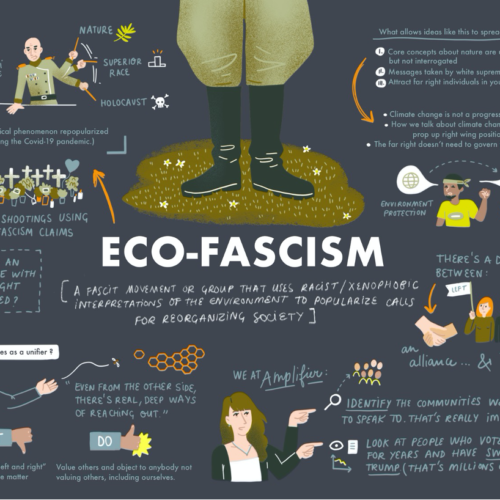Books That Spark Political Mojos & Utopian Imaginaries
A person who won’t read has no advantage over one who can’t. We read for many reasons, and one is to know that we are not alone. This is especially true for movement builders and folks yearning to be a part of a hive mind, navigating the world as part of collective political identity. Ezra Pound, compared a good book to a “ball of light”, a revitalising energy that makes us come alive, and Margaret Atwood noted that she learns the most from a book when it brings her pleasure.
These recommendations are some serious pleasure-inducing reads, some classics, some very recent offerings, all certain to tickle your brains and activate your inner political animal. Good books don’t give up all their secrets at once, their stories linger in the mind long after the first read, and they transform according to time and context. So even though busy activist schedules and oft-precarious livelihoods, don’t often accommodate for much reading time, when the time is found these titles can sculpt and inform your activist identity formation.
To demonstrate the power of a single book in a very literal material sense, Mexican artist Jorge Mendez Blake constructed a single wall of bricks without mortar, including an intentional subversion, a copy of Kafka’s ‘The Castle’ causing a brick ripple of beautiful imperfection. So let some of these titles add some kinks to the walls you’ve built.
1) Your Silence Will Not Protect You, Audre Lorde (2007)
A posthumous collection of essays, speeches, and poems by African American author and poet Audre Lorde. Lorde knew about harbouring multitudes. Political antagonists tried to discredit her among black students by announcing her sexuality, and she decided: “The only way you can head people off from using who you are against you is to be honest and open first, to talk about yourself before they talk about you.” Lorde emphasises repeatedly how important it is to speak up. To give witness: “What are the words you do not yet have? What do you need to say? What are the tyrannies you swallow day by day and attempt to make your own, until you will sicken and die of them, still in silence?”
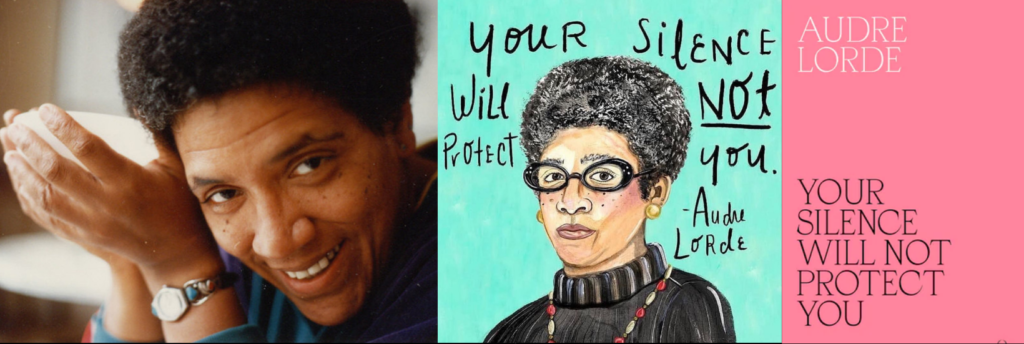
2) Post-Capitalist Desire, Mark Fisher (2016, edited by Matt Colquhoun)
“Do we really want what we say we want?” — Fisher explores the relationship between desire and capitalism, and wonders what new forms of desire we might still excavate from the past, present, and future. From the emergence and failure of the counterculture in the 1970s to the continued development of his left-accelerationist line of thinking, this volume charts a tragically interrupted course for thinking about the raising of a new kind of consciousness, and the cultural and political implications of doing so.
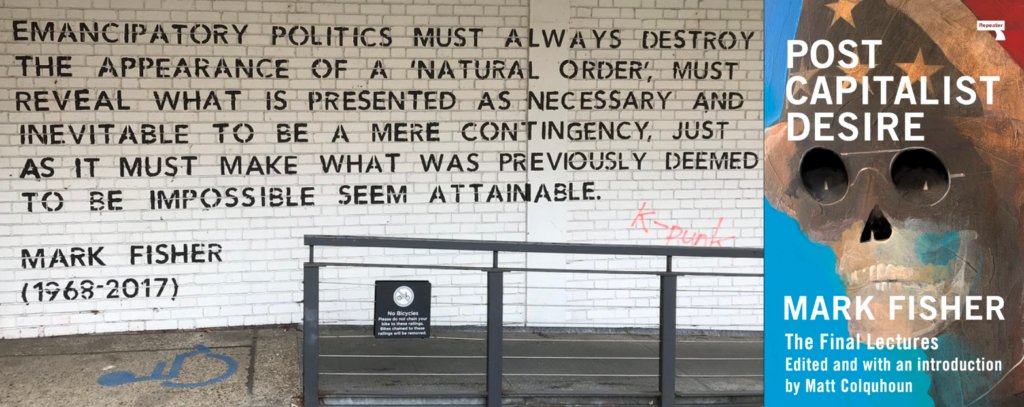
3) Rules for Radicals: A Pragmatic Primer for Realistic Radicals, Saul D. Alinsky (1971)
Already a classic from a community activist and writer about how to successfully run a movement for change. Risking a wee spoiler, because you’ll need to read it to get the full elaboration, but here are the rules:
- “Power is not only what you have but what the enemy thinks you have.”
- “Never go outside the expertise of your people.”
- “Whenever possible go outside the expertise of the enemy.”
- “Make the enemy live up to its own book of rules.”
- “Ridicule is man’s most potent weapon. There is no defense. It is almost impossible to counterattack ridicule. Also it infuriates the opposition, who then react to your advantage.”
- “A good tactic is one your people enjoy.”
- “A tactic that drags on too long becomes a drag.”
- “Keep the pressure on.”
- “The threat is usually more terrifying than the thing itself. “
- “The major premise for tactics is the development of operations that will maintain a constant pressure upon the opposition.”
- “If you push a negative hard and deep enough it will break through into its counterside; this is based on the principle that every positive has its negative.”
- “The price of a successful attack is a constructive alternative.”
- “Pick the target, freeze it, personalize it, and polarize it. “
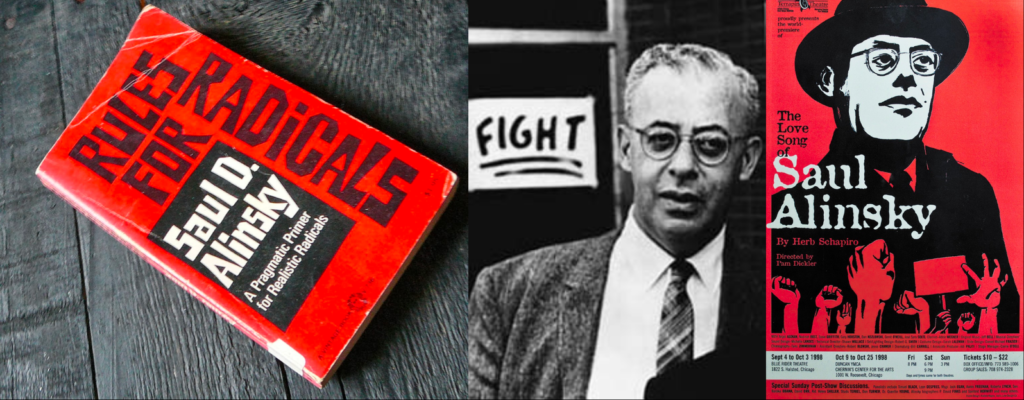
4) Feminism is for Everybody, bell hooks (2000)
‘Simply put, feminism is a movement to end sexism, sexist exploitation, and oppression.’ So begins Feminism is for Everybody, a short, accessible introduction to feminist theory by one of its most influential practitioners. Designed to be read by all genders, this book provides both a primer to the question ‘what is feminism?’ and an argument for the enduring importance of the feminist movement today. “Ending patriarchal domination of children, by men or women, is the only way to make the family a place where children can be safe, where they can be free, where they can know love. The Feminist movement is pro-family. ”
5) The Shock Doctrine: The Rise of Disaster Capitalism, Naomi Klein (2007)
“There is no humane way to rule people against their will.” Klein argues that neoliberal free market policies (as advocated by the economist Milton Friedman) have risen to prominence in some developed countries because of a deliberate strategy of “shock therapy”. This centers on the exploitation of national crises (disasters or upheavals) to establish controversial and questionable policies, while citizens are too distracted (emotionally and physically) to engage and develop an adequate response, and resist effectively. The book advances the idea that some man-made events, such as the Iraq War, were undertaken with the intention of pushing through such unpopular policies in their wake. “Extreme violence has a way of preventing us from seeing the interests it serves.”
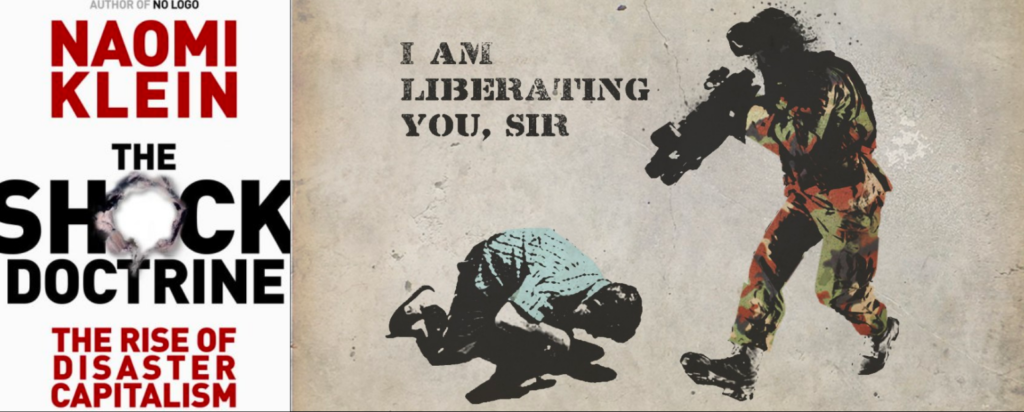
6) How to Blow Up a Pipeline: Learning to Fight in a World on Fire, Andreas Malm (2021)
Malm argues that sabotage is a logical form of climate activism, and criticizes both pacifism within the climate movement and “climate fatalism” outside it. In this lyrical manifesto, Malm makes an impassioned call for the climate movement to escalate its tactics in the face of ecological collapse. We need, he argues, to force fossil fuel extraction to stop—with our actions, with our bodies, and by defusing and destroying its tools. Here is how we fight in a world on fire, since “The epoch of the Capitalocene is characterized by uncontrolled speed-up in the production of hazardous nature.”
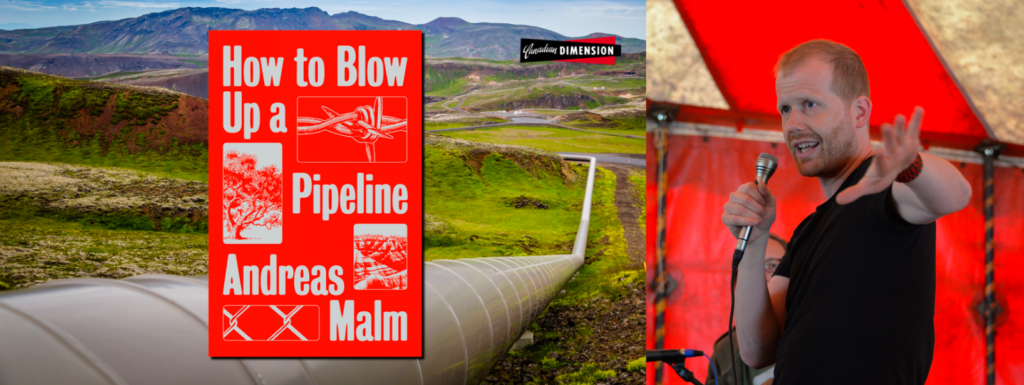
7) The Entangled Activist, Anthea Lawson (2021)
A story of how activism is entangled in the problems it seeks to solve, told by a hard-hitting campaigner who learns to see activism very differently. After years of thinking that her task was to ‘get the bastards,’ campaigner, writer and reporter Anthea Lawson came to see that activism often emerges from the same troubles it is trying to fix, and that its demons, including righteousness, saviourism, burnout and treating other people badly, can be a gateway to understanding the depth of what really needs to change.
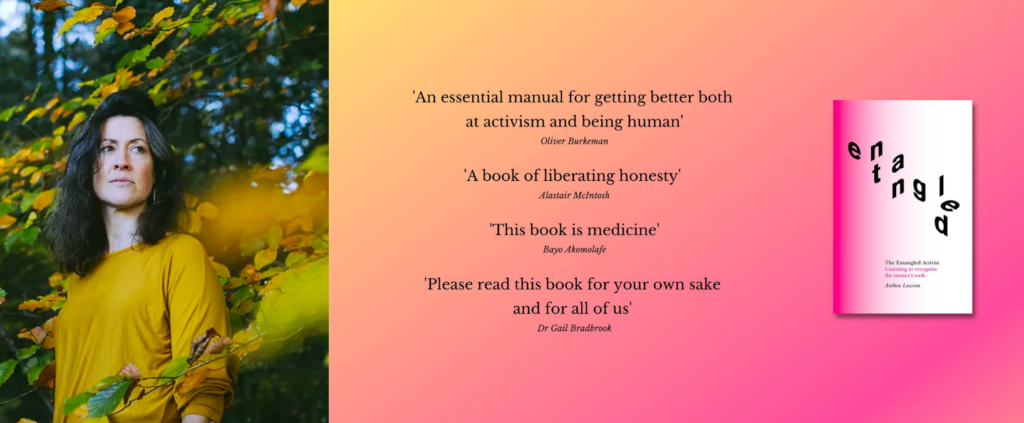
8) The Ecology of Freedom, Murray Bookchin (1982)
The father of libertarian municipalism describes his concept of social ecology, the idea that ecological problems are caused by human social problems and can be solved only by reorganizing society along ecological and ethical lines. Bookchin writes, “My use of the word hierarchy in the subtitle of this work is meant to be provocative. There is a strong theoretical need to contrast hierarchy with the more widespread use of the words class and State; careless use of these terms can produce a dangerous simplification of social reality. To use the words hierarchy, class, and State interchangeably, as many social theorists do, is insidious and obscurantist. This practice, in the name of a “classless” or “libertarian” society, could easily conceal the existence of hierarchical relationships and a hierarchical sensibility, both of which – even in the absence of economic exploitation or political coercion – would serve to perpetuate unfreedom.”
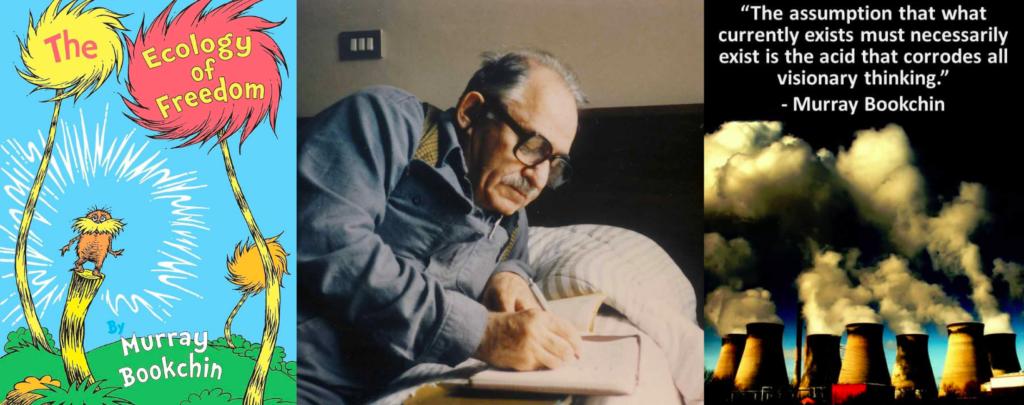
9) The Parable of the Sower, Octavia Butler (1993)
What would an activist’s reading list be without some good post-apocalyptic science fiction? Butler’s novel provides astute commentary on climate change and social inequality. The story follows Lauren Olamina in her quest for freedom. Several characters from various walks of life join her on her journey north and learn of a religion she has crafted titled Earthseed. In this religion, the destiny for believers is to inhabit other planets. She reminds us that god is change and that “Prodigy is, at its essence, adaptability and persistent, positive obsession. Without persistence, what remains is an enthusiasm of the moment. Without adaptability, what remains may be channeled into destructive fanaticism. Without positive obsession, there is nothing at all.”
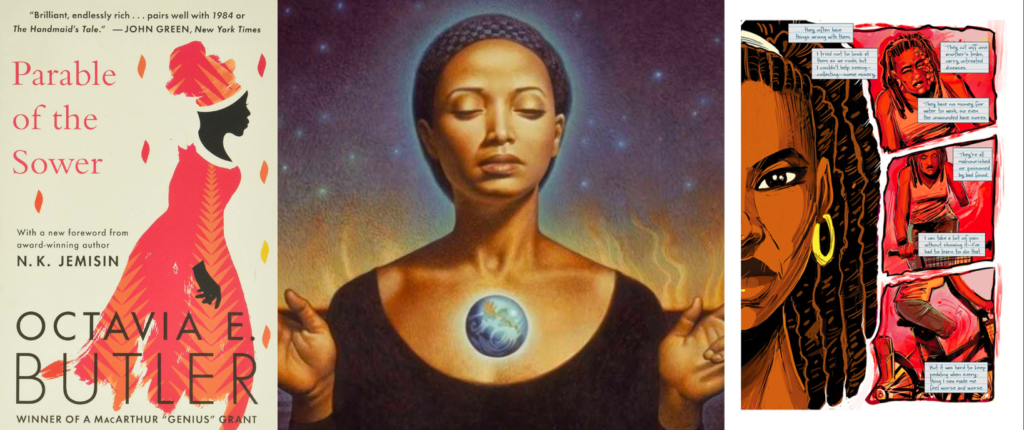
10) Bullshit Jobs: A Theory, David Graeber (2018)
In the early twentieth century, people prophesied that technology would see us all working fifteen-hour weeks and driving flying cars. Instead, something curious happened. Not only have the flying cars not materialised, but average working hours have increased rather than decreased. And now, across the developed world, three-quarters of all jobs are in services, finance or admin: jobs that don’t seem to contribute anything to society. In Bullshit Jobs, David Graeber explores how this phenomenon – once more associated with the Soviet Union, but which capitalism was supposed to eliminate – has happened. In doing so, he looks at how, rather than producing anything, work has become an end in itself; the way such work maintains the current broken system of finance capital; and, finally, how we can get out of it.
This book is for anyone whose heart has sunk at the sight of a whiteboard, who believes ‘workshops’ should only be for making things, or who just suspects that there might be a better way to run our world.
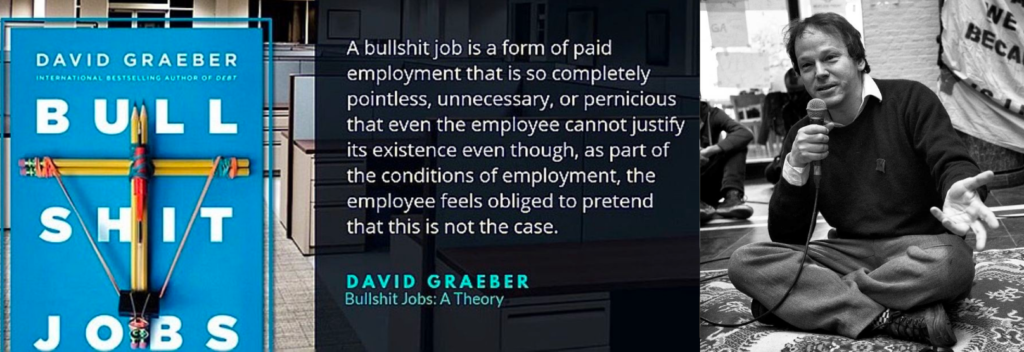
11) Hope in the Dark, Rebecca Solnit (2004)
Solnit makes a radical case for hope as a commitment to act in a world whose future remains uncertain and unknowable. Drawing on her decades of activism and a wide reading of environmental, cultural, and political history, Solnit argues that radicals have a long, neglected history of transformative victories, that the positive consequences of our acts are not always immediately seen, directly knowable, or even measurable, and that pessimism and despair rest on an unwarranted confidence about what is going to happen next. She asks us to remember that “Joy doesn’t betray but sustains activism. And when you face a politics that aspires to make you fearful, alienated and isolated, joy is a fine act of insurrection.”
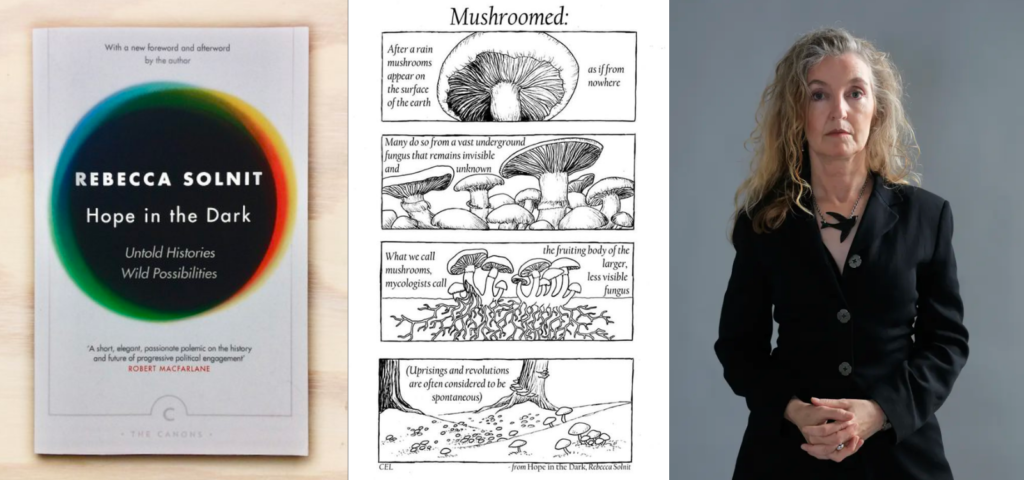
12) Less is More: How Degrowth Will Save the World, Jason Hickel (2020)
The world has finally awoken to the reality of climate breakdown and ecological collapse. Now we must face up to its primary cause. Capitalism demands perpetual expansion, which is devastating the living world. There is only one solution that will lead to meaningful and immediate change: degrowth.
If we want to have a shot at halting the crisis, we need to slow down and restore the balance. We need to change how we see nature and our place in it, shifting from a philosophy of domination and extraction to one that’s rooted in reciprocity and regeneration. We need to evolve beyond the dogmas of capitalism to a new system that’s fit for the twenty-first century. “By taking less, we can become more.”
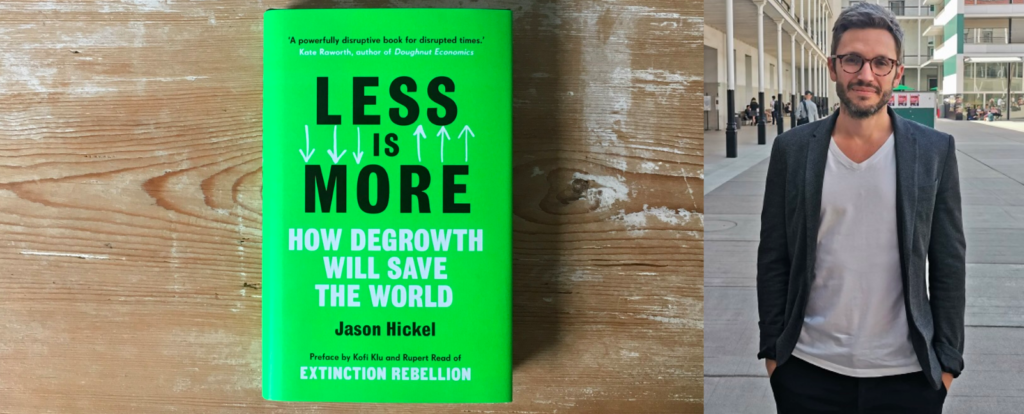
13) Freedom Is a Constant Struggle, Angela Davis (2005)
Activist and scholar Angela Y. Davis illuminates the connections between struggles against state violence and oppression throughout history and around the world.
Reflecting on the importance of black feminism, intersectionality, and prison abolitionism for today’s struggles, Davis discusses the legacies of previous liberation struggles, from the Black Freedom Movement to the South African anti-Apartheid movement. She highlights connections and analyses today’s struggles against state terror, from Ferguson to Palestine.
Facing a world of outrageous injustice, Davis challenges us to imagine and build the movement for human liberation. And in doing so, she reminds us that “Freedom is a constant struggle.”
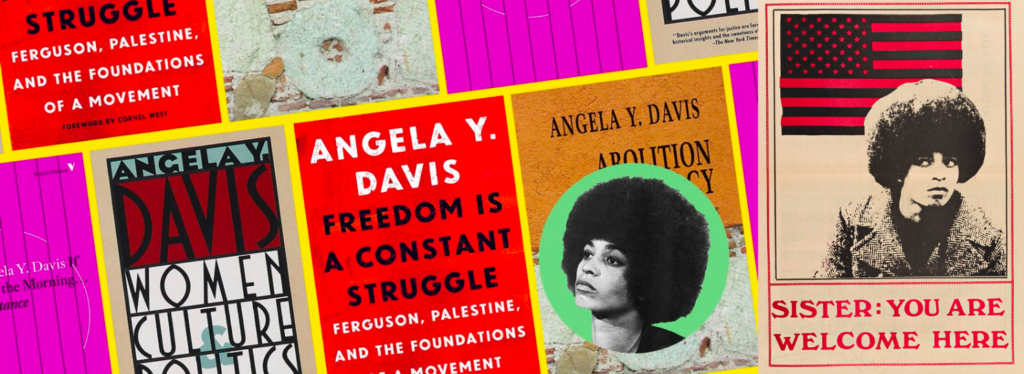
14) The Autobiography of Malcolm X, Alex Haley & Malcolm X (1964)
In the searing pages of this classic autobiography, Malcolm X, the Muslim leader, firebrand, and anti-integrationist, tells the extraordinary story of his life and the growth of the Black Muslim movement. His fascinating perspective on the lies and limitations of the American Dream, and the inherent racism in a society that denies its nonwhite citizens the opportunity to dream, gives extraordinary insight into the most urgent issues of our own time. The Autobiography of Malcolm X stands as the definitive statement of a movement and a man whose work was never completed but whose message is timeless. His words find cutting, transpartisan, universal resonance when he writes, “I was going through the hardest thing, also the greatest thing, for any human being to do; to accept that which is already within you, and around you.”
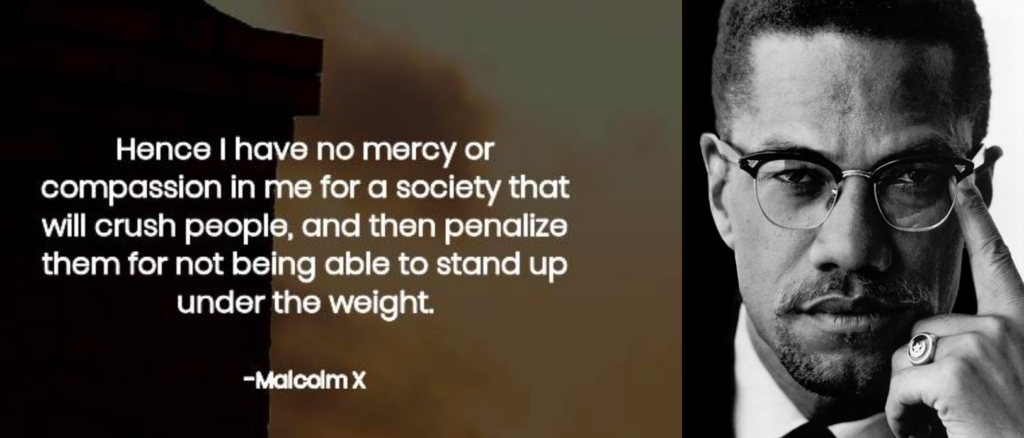
Which books have blown your mind or blown gusts of inspiration in your activism sails? I’ll be preparing another reading list when I have a dozen or so highly recommended titles, so send through yours at: ivan@guerrillafoundation.org – keep reading, stay rebellious.


